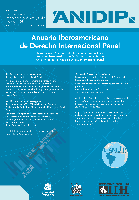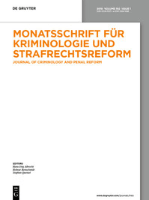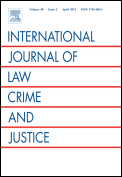
Champ Penal-Penal Field
Scope & Guideline
Contributing to a deeper understanding of legal impacts.
Introduction
Aims and Scopes
- Interdisciplinary Approaches to Penal Studies:
The journal encourages contributions from various disciplines including sociology, criminology, law, and cultural studies, fostering a comprehensive understanding of penal phenomena. - Focus on Gender and Vulnerability:
A consistent theme in the journal's publications is the examination of gender dynamics and vulnerabilities in the criminal justice system, highlighting how these factors influence experiences of crime and punishment. - Critical Analysis of Policing and Surveillance:
The journal addresses the evolving nature of policing and surveillance, particularly in the context of digital age challenges and societal responses to crime. - Rehabilitation and Reintegration:
Research on rehabilitation practices, including the experiences of incarcerated individuals and the effectiveness of post-custodial supervision, is a core focus, emphasizing transformative justice. - Socio-Historical Contextualization:
Many articles offer socio-historical analyses of penal practices and policies, examining how historical contexts shape contemporary penal systems and societal attitudes towards crime.
Trending and Emerging
- Impact of Digital Surveillance:
The rise of digital surveillance as a significant factor in contemporary policing and criminal justice is increasingly being explored, reflecting growing concerns about privacy, civil liberties, and the implications of technology on law enforcement. - Intersectionality in Penal Contexts:
There is a burgeoning interest in intersectional analyses that consider how various identities (e.g., gender, race, socio-economic status) interact to influence experiences within the penal system. - Community and Restorative Justice Practices:
Emerging themes emphasize community-based approaches to justice and rehabilitation, advocating for practices that focus on healing and reintegration rather than punishment. - Youth and Indiscipline:
A rising focus on issues related to youth behavior, indiscipline, and the socio-educational responses to these challenges reflects an increasing recognition of the complexities surrounding juvenile justice. - Victimology and Restorative Approaches:
The journal has seen an uptick in publications addressing the roles of victims within the penal system, emphasizing restorative justice frameworks that seek to address the needs and perspectives of victims.
Declining or Waning
- Traditional Approaches to Crime Control:
There is a noticeable decrease in publications that focus solely on traditional punitive measures and crime control strategies, as the discourse shifts towards rehabilitation and restorative justice. - Overly Generalized Theories of Crime:
Research that applies broad, generalized theories of crime without considering specific social contexts or individual experiences has become less frequent, reflecting a move towards more nuanced analyses. - Focus on Historical Penal Practices:
While historical analyses remain important, there has been a reduction in the number of articles specifically revisiting historical penal practices, as contemporary issues gain more traction in discussions.
Similar Journals

Women & Criminal Justice
Unveiling Injustices, Shaping SolutionsWomen & Criminal Justice, published by Routledge Journals, Taylor & Francis Ltd, stands as a prominent platform for scholarly discourse in the intertwined realms of gender studies and legal research. Since its inception in 1989, this journal has been pivotal in addressing the unique challenges and perspectives of women within the criminal justice system, making substantial contributions to the field. With a commendable impact factor reflected in its Q1 ranking in Law and Q2 ranking in Gender Studies, it offers both researchers and practitioners rigorous and insightful analyses. The journal covers a wide spectrum of topics, aligning contemporary issues with legal frameworks, while advocating for a nuanced understanding of gender-related injustices. Though it operates under a traditional access model, its invaluable insights foster essential discussions among academics, policymakers, and social advocates. By engaging with themes of societal crime, victimization, and justice reform, Women & Criminal Justice continues to underscore the importance of integrating gender awareness into legal scholarship and practice, thereby enriching the broader academic community.

Anuario Iberoamericano de Derecho Internacional Penal
Advancing legal scholarship in the Ibero-American context.Anuario Iberoamericano de Derecho Internacional Penal is a distinguished open-access journal dedicated to the field of international criminal law, published by UNIV ROSARIO, EDITORIAL. Since its inception in 2013, this journal has provided a platform for rigorous research and scholarly discussions related to the complexities of international penal law, enhancing understanding and application across Ibero-American jurisdictions. With an ISSN of 2346-3120, it caters to an audience of researchers, legal practitioners, and students who are keen to explore contemporary issues, case law, and reforms within the realm of international criminal justice. The journal aims to foster interdisciplinary dialogue, promote legal scholarship, and contribute to the development of international law principles in the Spanish-speaking world. As an essential resource for those engaged in the study and practice of international law, Anuario Iberoamericano de Derecho Internacional Penal continues to uphold a commitment to accessibility and academic excellence.

LAW & SOCIETY REVIEW
Exploring the Nexus of Law and SocietyLAW & SOCIETY REVIEW is a prestigious academic journal published by Wiley, recognized for its significant contributions to the intertwined fields of law, sociology, and political science. With an impressive impact factor that underscores its relevance, the journal boasts a 2023 Q1 designation in both Law and Sociology, highlighting its elite status within these disciplines. Since its inception in 1977, the journal has served as a critical platform for innovative research and discourse, reflecting contemporary issues that influence legal and societal frameworks. Although it does not currently offer open access options, its robust archival resources and global reach ensure that researchers, practitioners, and students can benefit from the insights and empirical studies presented within its pages. With Scopus rankings placing it in the top percentiles of its field, LAW & SOCIETY REVIEW remains essential for those seeking to deepen their understanding of law in its social context and explore the complexities of legal systems and their societal impacts.

LAW AND PHILOSOPHY
Challenging Doctrines, Shaping FuturesLaw and Philosophy is a distinguished academic journal published by Springer, focusing on the intersection of legal studies and philosophical inquiry. With an esteemed impact factor reflecting its influence in the field, the journal has achieved notable ranks, placing it in Q2 in Law and Q1 in Philosophy as of 2023. Readers can access it through institutional subscriptions, emphasizing its role in enriching debates around law's philosophical underpinnings. This journal, with its inception in 1982 and continuing through 2024, provides a platform for innovative ideas, fostering dialogue among researchers, professionals, and students. It aims to publish cutting-edge articles that challenge existing doctrines and propose new theoretical frameworks, making it essential for anyone engaged in the critical study of law and its philosophical ramifications.

Cadernos de Dereito Actual
Fostering dialogue in modern law.Cadernos de Dereito Actual is a distinguished peer-reviewed journal published by the University of Santiago de Compostela, focusing on contemporary legal studies and current issues within the field of law. With its open access model instituted since 2013, the journal aims to enhance the accessibility of legal research and foster academic dialogue among researchers, professionals, and students globally. Featuring an ISSN of 2340-860X and an E-ISSN of 2386-5229, Cadernos de Dereito Actual is committed to publishing high-quality articles that contribute to the advancement of legal scholarship. Although specific metrics such as the H-index and Scopus rankings are not currently available, the journal remains a pivotal platform for innovative research and insights within the field of law, promoting rigorous academic standards and interdisciplinary approaches. For further information or to submit your research, please contact the publication service at SERVICIO DE PUBLICACIONES E INTERCAMBIO CIENTIFICO, CAMPUS UNIV SUR, SANTIAGO DE COMPOSTELA 15782, SPAIN.

Monatsschrift fur Kriminologie und Strafrechtsreform
Innovative Insights into Law and Justice.Monatsschrift für Kriminologie und Strafrechtsreform is a prestigious academic journal dedicated to advancing the fields of criminology and legal reform. Published by WALTER DE GRUYTER GMBH in Germany, this journal boasts a significant history since its inception in 1943, continually evolving its focus and scope from 2010 to 2024 to address contemporary issues in law and criminal justice. With an impressive Q2 rating in Law and a ranking in the 46th percentile among social sciences law journals, it serves as a vital resource for researchers, practitioners, and students alike. By publishing innovative articles, critical reviews, and comprehensive studies, the journal aims to foster academic discourse and propel discussions surrounding legislative reforms and criminological theories. Although it does not currently offer open access, readers can obtain valuable insights that contribute to both academic scholarship and practical applications in the legal field, thereby enhancing the understanding of complex societal dynamics related to crime and law enforcement.

CALIFORNIA LAW REVIEW
Illuminating Complex Legal Issues with ClarityCalifornia Law Review, published by the University of California, Berkeley School of Law, stands as a premier academic journal in the field of law, boasting a distinguished reputation reflected in its Q1 category rank within the Scopus database, placing it in the 83rd percentile of social sciences law journals. Since its founding, this journal has provided a critical platform for innovative legal scholarship and discourse, drawing upon a rich tapestry of contributions from leading scholars, practitioners, and students. Although not an open-access publication, it offers diverse access options through university libraries and institutional subscriptions, ensuring a wide dissemination of its impactful research. In light of its historical significance and contemporary relevance, California Law Review continues to shape legal thought and practice, fostering a deeper understanding of complex legal issues in the United States and beyond.

Salus Journal
Fostering Collaboration in Health ResearchSalus Journal, published by Charles Sturt University, is an esteemed open-access journal dedicated to advancing the field of health sciences. Established in 2013, this journal emphasizes the dissemination of innovative research and critical analyses that influence evidence-based practices in healthcare and wellness. With its commitment to making high-quality research accessible to a global audience, Salus Journal plays a crucial role in fostering academic collaboration and dialogue among researchers, professionals, and students alike. Its focus on interdisciplinary approaches encourages contributions across various domains of health, ensuring that it remains a vital resource for the community. The journal is easily accessible online, promoting the visibility and impact of published works. For more information and to stay updated with the latest research in health sciences, visit their website and explore the wealth of knowledge available.

Journal of Penal Law and Criminology-Ceza Hukuku ve Kriminoloji Dergisi
Exploring the Frontiers of Criminal Law and CriminologyThe Journal of Penal Law and Criminology-Ceza Hukuku ve Kriminoloji Dergisi, published by ISTANBUL UNIV, is a prestigious platform dedicated to the advancement of knowledge in the fields of criminal law and criminology. With its Open Access policy adopted since 2017, it aims to promote the dissemination of research findings and theoretical discussions, ensuring that vital insights in criminal justice, legal reforms, and criminological studies are accessible to a global audience. This journal serves as a vital resource for academics, legal practitioners, and students alike, fostering interdisciplinary dialogue and encouraging innovative research. By focusing on contemporary issues in penal law and criminology, the journal enhances understanding and addresses the complexities of justice in a rapidly changing society. With an ISSN of 2148-6646 and an E-ISSN of 2602-3911, it continuously strives to maintain high scholarly standards and relevance in its contributions to the field.

International Journal of Law Crime and Justice
Shaping the Future of Law and Justice Through ScholarshipThe International Journal of Law Crime and Justice, published by ELSEVIER SCI LTD, serves as a pivotal platform for the dissemination of cutting-edge research in the fields of law, crime, and justice. Established in 2008, the journal has established itself as a reputable source in its domain, holding a respectable Q2 ranking in Law, Political Science and International Relations, as well as Sociology and Political Science as of 2023. With an impact factor reflecting its influence, this journal ranks favorably within the top percentiles of Scopus in several social science categories, making it a critical resource for scholars and practitioners. The journal promotes open access, ensuring that vital research is accessible to a global audience. Scholars interested in the intricate intersection between legal studies, societal challenges, and crime will find the journal's objectives aligned with fostering knowledge and innovation in this dynamic field. Operating from its headquarters in London, England, the journal continues to invite substantial contributions that address contemporary issues and enhance our understanding of law and justice worldwide.